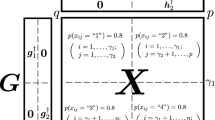Abstract
A procedure to find a unique solution for multi-response optimization problems based on indexing is presented. The procedure utilizes principal component analysis to map the original data to a new vector of component scores, transforming the original response variables into uncorrelated principal components. This process involves loadings that are the elements of the eigenvectors corresponding to the eigenvalues of response variables in the correlation matrix. It is shown that for a given eigenvalue λ, its corresponding eigenvectors are not unique, which could lead to different “optimal” parametric (factor-level) settings and will further mislead the process or product improvement strategy. The proposed indexing method will determine a unique optimal solution in the presence of (2p)(p!) combinations of eigenvectors.
Similar content being viewed by others
References
Hung C (1990) A cost-effective multi-purpose off-line quality control for semiconductor manufacturing. Dissertation, National Chiao Tung University, Taiwan
Lin J, Lin C (2002) The use of the orthogonal array with grey relational analysis to optimize the electrical discharge machining process with multiple performance characteristics. Int J Mach Tools Manuf 42(2):237–244. doi:10.1016/S0890-6955(01)00107-9
Gauri S, Pal S (2010) Multi-response optimization using multiple regression-based weighted signal-to-noise ratio (MRWSN). Qual Eng 22(4):336–50. doi:10.1080/08982112.2010.495368
Su C, Tong L (1997) Multi-response robust design by principal component analysis. Total Qual Manag 8(6):409–416. doi:10.1080/0954412979415
Liao H (2006) Multi-response optimization using weighted principal component. Int J Adv Manuf Technol 27(7–8):720–725. doi:10.1007/s00170-004-2248-7
Auer C, Erdbrügge M, Göbel R (2004) Comparison of multivariate methods for robust parameter design in sheet metal spinning. Appl Stoch Model Bus Ind 20(3):201–218. doi:10.1002/asmb.525
Gauri S, Pal S (2014) The principal component analysis (PCA)-based approaches for multi-response optimization: some areas of concerns. Int J Adv Manuf Technol 70(9–12):1875–1887. doi:10.1007/s00170-013-5389-8
Antony J (2000) Multi-response optimization in industrial experiments using Taguchi’s quality loss function and principal component analysis. Qual Reliab Eng Int 16(1):3–8. doi:10.1002/(SICI)1099-1638(200001/02)16:1<3::AID-QRE276>3.0.CO;2-W
Chandra M (2001) Statistical quality control. CRC Press, New York
Fung C, Kang P (2005) Multi-response optimization in friction properties of PBT composites using Taguchi method and principal component analysis. J Mater Process Technol 170(3):602–610. doi:10.1016/j.jmatprotec.2005.06.040
Author information
Authors and Affiliations
Corresponding author
Rights and permissions
About this article
Cite this article
Fard, N., Xu, H. & Fang, Y. A unique solution for principal component analysis-based multi-response optimization problems. Int J Adv Manuf Technol 82, 697–709 (2016). https://doi.org/10.1007/s00170-015-7358-x
Received:
Accepted:
Published:
Issue Date:
DOI: https://doi.org/10.1007/s00170-015-7358-x




